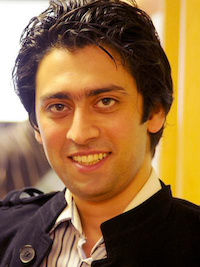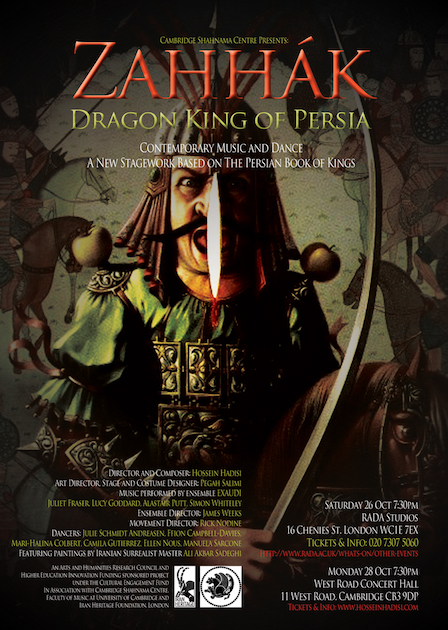- Shahnameh by Ferdowsi: Zahhák, Dragon King of Persia
- Director and Composer: Hossein Hadisi
- Art Director, Costume and Stage Design: Pegah Salimi
- Movement Director: Rick Nodine
- Music Performed by Ensemble Exaudi, Director: James Phil Brent Weeks Juliet Fraser (soprano), Lucy Goddard (alto), Alastair Putt (tenor), Simon Whiteley (bass)
- Dancers: Manuela Sarcone, Julie Schmidt Andreasen, Ellen Nous, Camila Gutierrez, Ffion Campbell-Davies, Mari-Halina Colbert
- An Arts and Humanities Research Council and Higher Education Innovation Funding sponsored project under the Cultural Engagement Fund Produced with the help of the Cambridge Shahnama Centre in association with Iran Heritage Foundation, UK and in media partnership with the 4th London Iranian Film Festival
My first postdoctoral research project at the Faculty of Music, University of Cambridge was around the use of various musical modes I collected for Maqam Encyclopaedia. This resulted in a parallel research in the Persian art of Naqqali (storytelling). Thanks to support from Dr. Firuza Melville and Professor Charles Melville of Shahnama Centre, Pembroke and funding from AHRC’s Cultural Engagement Fund, I wrote Ballet Zahhak. I studied all available versions of the story, as well as comparing major versions of Shahnama and the piece was premiered on 26/102013 in Royal Academy of Dramatic Arts Studios (RADA Studios), London.
Subsequently, a film of the concert was made and a shorter version of it was prepared for television. Subtitles, Farsi narrations and a finale song were added to the film for it to be aired on the Norouz of 2014 (Persian New Year) immediately after the new year, on Voice of America’s international satellite television network.
ZahhåkEnter Zahhák, Dragon King of Persia
“A contemporary interpretation of a myth drawn from one of the world’s greatest poems will be performed at the West Road Concert Hall on Monday, 28 October. Through voices, percussion and dance, the work will introduce the audience to one of the many myths contained in the Persian ‘Book of Kings’ or Shahnama.
The performance is the world premiere of a new stage work – Zahhák, Dragon King of Persia – devised by composer and musician, Dr Hossein Hadisi. He is currently a Research Associate at Cambridge University’s Faculty of Music. His research focuses on the philosophy and expression of the traditional Persian improvisation school of Avaz – a vocal tradition rooted in improvised story telling.
Of central importance to the cultural identity of Iran, the Shahnama is an epic poem written more than 1,000 years ago by the poet Ferdausi, a giant of Persian literature. With 50,000 verses, it is the longest poem ever written by a single author. Through a series of myths and historical references, Ferdausi tells the story of the Persian empire from the creation of the world until the Islamic conquest of Persia in the 7th century. Copies of the Shahnama – which are highly prized for their exquisite calligraphy, painting and illuminations – exist in libraries and archives all over the world.
Zahhák , Dragon King of Persia celebrates the Persian minstrels’ art of Naqqáli – a now near-extinct tradition of travelling performers who interpret folklore handed down through generations largely through improvisation. In Hadisi’s interpretation verses from the Shahnama are sung in the original Persian, accompanied by surtitles of English translations. A group of percussionists will produce spell-binding sounds from instruments as unusual as hacksaw, stone, chain and baking foil.
According to the myth narrated in the Shahnamah, Prince Zahhák makes a pact with Satan to kill his father so that he can become king. Shortly afterwards, as Zahhák sits on his throne, two snakes grow out of his shoulders at the points where Satan has kissed him: a horrific punishment for the crime of patricide. Unrepentant and greedy for power, Zahhák orders two young men to be killed each day so that their brains can be fed to the snakes, whose appetite cannot be sated.
As Zahhák loses his hold on his people and his grip on sanity, he becomes consumed by fear, rage and violence. At the end of the performance the audience is left with a choice that is both historic and topical: whether to live in fear or to rise up and overthrow the tyrant.
As a child raised and educated in Iran, Hadisi learnt the piano and violin as well as becoming proficient in a variety of traditional Persian instruments including cetar, lute and tar. His musical career has blended classical, contemporary and rock – and he has also been involved in writing and directing short films. He worked in Malaysia, primarily as a composer, before coming to the UK to study for a PhD in composition under Michael Finnissy and colleagues at the University of Southampton.
Hadisi is currently a Research Associate at Cambridge University’s Faculty of Music. His research focuses on the philosophy and expression of the traditional Persian improvisation school of Avaz – a vocal tradition rooted in improvised story telling.
All these strands of Hadisi’s interests in music and performance come together in his latest work which explores folk traditions in music and theatre to produce an operatic and dynamic performance that’s highly contemporary. “I hope it will appeal to anyone interested in contemporary music, dance and drama,” he says. “In devising the work, I’ve played with the world of the imagination and make believe in the interpretation that draws a powerful story of some universal human themes.”
Hadisi’s vocal music for Zahhák, Dragon King of Persia is performed by EXAUDI, one of Britain’s leading contemporary music ensembles, directed by James Weeks. The story is interpreted by nine female dancers directed by choreographer, Rick Nodine. The performance also features paintings by the surrealist Ali Akbar Sadeghi, one of Iran’s most prominent artists, which will be used for projections in a way that references the painted curtains that minstrels used as backdrops.
Zahhák , Dragon King of Persia is an Arts and Humanities Research Council and Higher Education Funding sponsored project under the Cultural Engagement Fund. It is produced with the help of the Shahnama Project at Cambridge University in association with the Iran Heritage Foundation, UK.
The Shahnama Project is a global resource that allows access to 1500 manuscripts and single pages, 18,000 paintings and 12,000 images from all over the world.”

